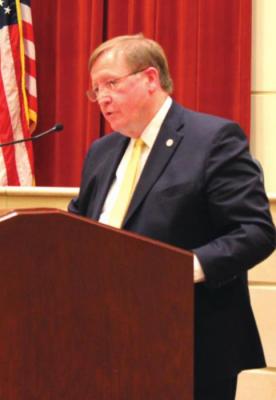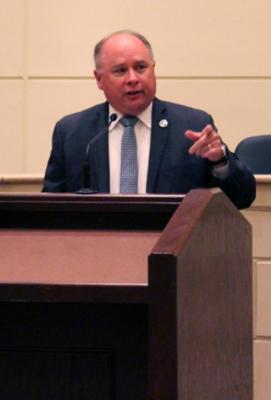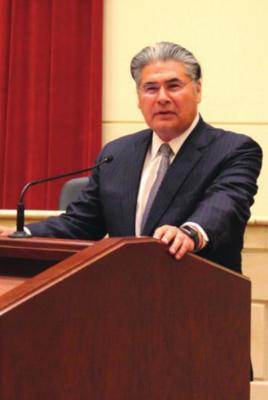Ponca Politics hold McGirt Ruling forum
A political forum was held in City Hall on Friday, May 27 to discuss the McGirt Ruling with a panel of experts. The experts for the forum were Wilson Pipestem, the founding partners of the law firm: Pipestem Law, who has been at the center of national advocacy that has changed modern federal law and policy toward tribal nations and tribal citizens; United States Marshall for the Northern District of Oklahoma, Clayton Johnson; and 8th District (Kay and Noble Counties) Attorney Brian Hermanson.
Each speaker took the opportunity to elaborate on the nature of the ruling and what its outcomes mean. Pipestem was the first to speak and went over the ruling itself and the response to it.
McGirt v. Oklahoma was a United States Supreme Court case that ruled much of the eastern part of Oklahoma remain Native American lands of the prior Indian reservations for the Five Civilized Tribes and were never disestablished by Congress as part of the Oklahoma Enabling Act of 1906. This means that the prosecutions of crimes by Native Americans on these lands falls into the jurisdiction of the tribal courts and federal judiciary under the Major Crimes Act, instead of Oklahoma courts. Following McGirt, Oklahoma State Courts began vacating past criminal cases to turn them over to federal courts
“The State of Oklahoma and many other entities within the state aggressively oppose this outcome,” said Pipestem. “The tribes have a different view about that, and so after this decision came down, Governor Stitt and others sought reconsideration of the McGirt decision through another case called Castro-Huerta.”
Oklahoma v. Castro-Huerta is a case that is currently pending and is related to McGirt. Oklahoma sought to have McGirt overruled and gain clarity on whether the state could prosecute non-Native Americans for crime against Native Americans on Native lands. Victor Manuel Castro-Huerta, a non-Native, was convicted of child neglect against his stepdaughter, who is Native American. The crime was committed within Indian territory.
“There were two questions presented to the Supreme Court that the State of Oklahoma and others wanted the Supreme Court to decided. One was basically reconsideration of McGirt and was a question of reservation boundaries,” said Pipestem. “The other was still the pending one: does a state have concurrent criminal jurisdiction to prosecute non-Indians who commit crimes against Indians? Right now, that law says that only the United States has jurisdiction to bring those court cases.”
Pipestem further elaborated that since the Supreme Court decided to not decide the first question, but are looking into the second and that is currently awaiting a decision.
“It use to be that the Congress made decisions in relation to tribes and Indian country. Indian country was sort of the playground of whatever (Congress) wanted to do,” said Pipestem. “That is no longer the case. Tribal governments have significant influence at a federal level and certainly not only with our Oklahoma delegation, but also across the United States. The idea of immediately going to Congress and getting them to reverse the McGirt decision was met with absolute resistance.”
Pipestem shared that the Cherokee Nation and the Chickasaw Nation decided they wanted their own special legislation that would allow them to reach agreements with the State of Oklahoma to shift the jurisdiction over certain criminal cases. Representative Tom Cole, a member of the Chicksaw Nation, introduced a bill that thus far hasn’t received a hearing.
“The likelihood of Congress providing some response to this until things settle out and theres common views among interested parties here in Oklahoma and across the country, because other tribes feel they have rights at stake here too, is not very good,” said Pipestem. “There does not appear to be legislation on the horizon that is going to fix the McGirt decision or even a change in it in someway, because there are disagreements among people here in Oklahoma and that is shaking out. What Congress has done, is appropriate for money for tribal courts so they will be able to handle the number of new cases involving jurisdictional radiance.”
Generally speaking, Pipestem hopes that the officials across the board in the state lower the rhetoric about how terrible McGirt is, and instead the state and tribes work to solve problems together.
Next to speak was Clayton Johnson and shared some background on the McGirt v. Oklahoma and the impact that he has seen on Northern Oklahoma.
Jimmy McGirt was a member of the Seminole tribe who was found guilty and sentenced to life in prison without the possibility of parole, plus with two 500-year sentences in June of 1997 for multiple sexual assaults against a 4-year old girl. When the McGirt decision came out, a retrial was held and after three days of testimonies, McGirt was found guilty again.
Johnson elaborated on the nature of the ruling and how it affects not only Native American defendants, but also the cases where a Native American is the victim of a crime.
“If the offender is a Native American or the victim is a Native American, then it falls under the jurisdiction of either the tribes or the federal government,” said Johnston. “Now the federal government has exclusive jurisdiction on Major Crime Act crimes: murder, manslaughter, kidnapping, maiming, those sort of offenses. And so those cases, the United States Attorney is the prosecution. Lesser offenses, the United States Attorney can handle those cases or they can be given over to the tribes for prosecution.”
Last to speak was DA Brian Hermanson and spoke about the Murphy case. Murphy v. Royal was a case that came down in 2017 and involved Patrick Dwayne Murphy, a member of the Muscogee (Creek) Nation, who was accused of committing a murder of another Native American within the Creek Reservation. The Court held that Oklahoma state courts lacked the jurisdiction to try Murphy as he was a member of the Muscogee (Creek) Nation. A decision wasn’t reached on this case until after McGirt.
“We have always had jurisdiction to go on tribal property to do certain things. We get calls all the time when a non-tribal person commits a crime at a casino, they call the local sheriff’s office or police department to deal with those issues,” said Hermanson.
One of the problems being faced is the tribes have been adding to their prosecution personnel to come and help with the case load and that has caused many prosecutors the loss of their personnel, because their seasoned lawyers are being hired away.
Hermanson encouraged people to read the decisions on McGirt and Murphy as well as the looking into the history of that led to those decisions through the Trail of Tears and the disestablishment of the reservations.
Following the McGirt ruling, the FBI’s jurisdiction in Oklahoma has expanded by almost 45% of the state’s land, and as mentioned above, the Supreme Court agreed to hear Oklahoma v. Castro-Huerta in Jan. 2022 to refine the scope of McGirt, but that the Court has no intention of overturning the decision.



